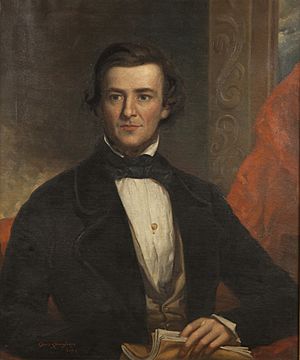David D. Mitchell facts for kids
Quick facts for kids
David D. Mitchell
|
|
|---|---|

Portrait of Col. David Dawson Mitchell by Charles Chambers (after Manuel Joachim De Franca), ca. 1900, Missouri History Museum
|
|
| Superintendent of Indian Affairs at St. Louis | |
| In office 1841–1843 |
|
| Superintendent of Indian Affairs at St. Louis | |
| In office 1849–1853 |
|
| Personal details | |
| Born |
David Dawson Mitchell
July 31, 1806 Louisa County, Virginia, United States |
| Died | May 23, 1861 (aged 54) St. Louis County, Missouri, United States |
| Occupation | Fur trader, Indian Affairs administrator |
David D. Mitchell (born July 31, 1806 – died May 23, 1861) was an American fur trader and a leader in Native American affairs in St. Louis. He became a Lieutenant Colonel for his service during the Mexican–American War. Mitchell was also involved in a famous court case called a freedom suit, where a woman named Polly Berry sued for her daughter Lucy's freedom.
Contents
Early Life and Fur Trading
David Dawson Mitchell was born on July 31, 1806, in Louisa County, Virginia.
He started his career as a fur trapper in 1824 in St. Louis, Missouri. He became a leader among trappers and hunters. Later, he even became a part-owner of a fur trading company.
Military Service
When the Mexican–American War began, Mitchell joined the United States Army. He was promoted to Lieutenant Colonel. This was in recognition of his service during a long journey known as the Doniphan's Expedition. This expedition traveled through New Mexico, Chihuahua, Texas, and New Orleans. After the expedition, he returned to Missouri.
Working with Native Americans
The Bureau of Indian Affairs was a government office. It aimed to help Native Americans adapt to new ways of life. They believed fur traders were good at helping with these policies. Mitchell, as the superintendent in St. Louis, was seen as someone who knew "the Country, the Indian and the Mischief that we wish to remedy."
Mitchell worked to make sure pioneers could travel safely westward. This was agreed upon in the Treaty of Fort Laramie (1851). He also wanted to ensure Native Americans received fair payment. This was because travelers were crossing their traditional hunting lands. This greatly reduced the number of buffalo and other animals.
He believed the government should help Native American tribes. He thought they could be saved by learning farming. He said:
Humanity calls loudly for some interposition on the part of the American government to save, if possible, some portion of these ill-fated tribes; and this, it is thought, can only be done by furnishing them with the means, and gradually turning their attention to agricultural pursuits. Without some aid from the government, it will be impossible for them to make an attempt even as graziers.
Personal Life
In 1840, Mitchell married Martha Eliza Berry. Around that time, a young enslaved girl named Lucy Berry came to live with them. She was from Martha's family.
The Lucy Ann Delaney Freedom Suit
On September 8, 1842, a woman named Polly Berry filed a special lawsuit. It was called a "freedom suit." She filed it for her daughter, Lucy, against David Mitchell.
In those days, a rule called partus sequitur ventrem was used. This rule meant that a child's freedom status followed their mother's. Lucy's mother was considered free when Lucy was born in Illinois. Because of this, Lucy should also have been free.
Lucy was held in jail for 17 months during the case. Mitchell wanted her to stay in St. Louis until the trial. A judge set a $2,000 bond. This was to ensure Mitchell would not try to take Lucy away. In the end, both Polly and Lucy won their individual cases and became free.
Death
Mitchell died on May 23, 1861, in St. Louis. He was buried at Calvary Cemetery.
 | May Edward Chinn |
 | Rebecca Cole |
 | Alexa Canady |
 | Dorothy Lavinia Brown |

